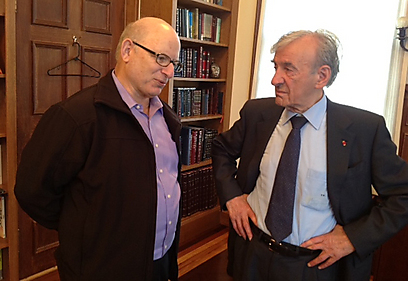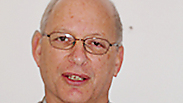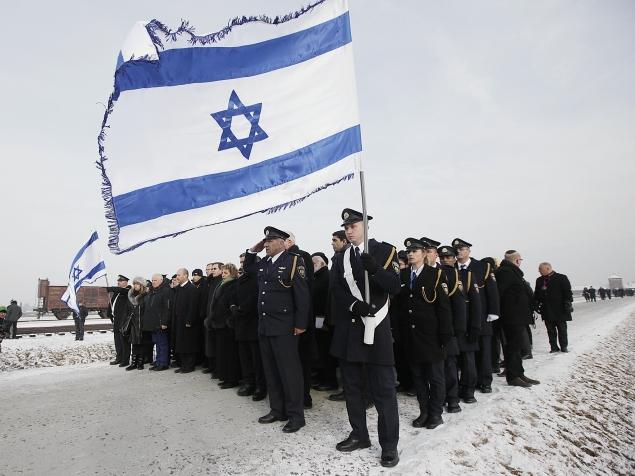Elie a no-show at Auschwitz event, but delivers an interview saying Jews can’t be Jews without Israel
Sunday, February 2nd, 2014

Elie Wiesel, right, in his office at Boston University with his Israeli editor, Yoel Rappel, whose interview with the famous survivor was published on January 28th in Israel’s Y-Net News.
By Carolyn Yeager
“Personal reasons” has been given for Elie Wiesel’s failure to attend this year’s annual International Day of Commemoration in Memory of Victims of the Holocaust at Auschwitz-Birkenau January 27th. This United Nations-declared commemoration day (since 2006) is being incorrectly called “Holocaust Memorial Day” or “Holocaust Remembrance Day” by the media and others who don’t feel like repeating the long, actual title.
The latter can become a problem because, as Wiesel’s interviewer pointed out in what follows : “The American nation officially commemorates the memory of the victims of the Holocaust on the same day as the State of Israel” — that is, on Yom Hashoah according to the Hebrew calendar, which falls in the Spring (April or May). This event is called “Days of Remembrance” and lasts for 7 days, beginning on Saturday evening Shabbat and ending at Shabbat one week later. In this, like in so much else, the U.S. is in lock-step with Israel (with Israel leading, the United States Congress following).
However, both the U.S. and Israel also support and join in with the newer January 27th United Nations-proclaimed commemoration, since it was conceived and pushed through the UN by the State of Israel. See here at bottom of page. That gives the world two major “Holocaust remembrance” events, all the better to “engrave” the holocaust into the minds of all humanity, but especially Western man.
The Interviewer
 Yoel Rappel grew up in Israel and lived most of his life there. We’re not told if he was born there, but it seems so. He worked 40 years as a journalist and senior program editor at the Israel Broadcasting Authority, Israel’s main radio channel. Before coming to Boston University as Visiting Scholar at the Elie Wiesel Center for Jewish Studies, he also taught at Bet Berl College, the Avshalom Institute for Israel Studies, and served as content manager at the Center for Jewish Identity in Bar Ilan University … all in Israel.
Yoel Rappel grew up in Israel and lived most of his life there. We’re not told if he was born there, but it seems so. He worked 40 years as a journalist and senior program editor at the Israel Broadcasting Authority, Israel’s main radio channel. Before coming to Boston University as Visiting Scholar at the Elie Wiesel Center for Jewish Studies, he also taught at Bet Berl College, the Avshalom Institute for Israel Studies, and served as content manager at the Center for Jewish Identity in Bar Ilan University … all in Israel.
He serves as project manager for the Elie Wiesel Archive. He is the editor of the Hebrew editions of Prof. Wiesel’s books “The Biblical Soul,” “The Hasidic Soul” and “The Talmudic Soul,” which were published in Hebrew by the Yedioth Books publishing house. [Getting everything ready for Elie Wiesel’s coming sainthood -cy]
The Interview
[Rappel points out that it was Wiesel who coined the expression, “Not all victims were Jews, but all Jews were victims.” ]
Wiesel: “The Holocaust is a unique event, but it has a universal significance which must be memorized incessantly.”
[The reason for this, Rappel tells us, is so it will be engraved in people’s minds, so that the events of 1939-1945 will not repeat themselves and the world will not be indifferent and silent*, as it was then.] *A reference to the Yiddish book, “And the World Remained Silent” claimed to have been written by Wiesel.
Wiesel: “Unfortunately, anti-Semitism still exists. It has been alive for more than 2,000 years, and will likely continue living. I thought that the memory of the Holocaust would shame those boasting anti-Semitic opinions. I was wrong. It still exists in different countries, and it seems people are no longer ashamed to be anti-Semitic.”
[Rappel says “the murky wave of anti-Semitism sweeping over the Western world, as well as Eastern Europe (with the recent incidents in Hungary and Ukraine), is fresh.]
Wiesel: “The modern anti-Semite is, first and foremost, anti-Israel. It’s very difficult to separate between the two. There are anti-Semites who are only anti-Israel. Once I thought that anti-Semitism had ended; today it is clear to me that it will probably never end. It might weaken sometimes, but it will continue existing, because in different countries there is no shame in being an anti-Semite. We must remember that anti-Semitism led to Auschwitz. Without anti-Semitism there would have been no Auschwitz.”
[Rappel says that Wiesel is one of the State of Israel’s greatest advocates, and that Wiesel argues that the fundamental problem {today?} is the attitude towards Israel and not anti-Semitism.]
Wiesel: “It’s clear to me that one can’t be Jewish without Israel*. Religious or non-religious, Zionist or non-Zionist, Ashkenazi or Sephardic – all these will not exist without Israel. The State’s existence is the oxygen of the image and ideas of the new anti-Semitism.” *Dangerous, fanatical talk. It follows that if Israel goes, so also do Jews. With that thinking, anything is allowed to Jews to prevent it … is what Wiesel is getting at. The failure of Israel would be another form of “extermination of the Jews,” another “holocaust.” -cy
[Wiesel is asked whether the public dispute over circumcision and ritual animal slaughter also stem from anti-Semitism.]
Wiesel: “In my opinion, it stems first of all from ignorance and disregard of the Jewish faith. Those who raise such ideas and others will soon come up with the idea to cancel Shabbat, so that Jews will rest on Sunday. It’s more of a case of ignorance, and it leads to harassment against the foundations of Judaism.”
[Rappel wants to know if the different phenomena experienced recently by the Jewish community in the United States can be defined as anti-Semitism.]
Wiesel: “There are expressions of anti-Semitism, yet we can’t talk about an anti-Semitic movement but about groups of anti-Semites which operate in different places, and we don’t know how many members they have. This reality must also concern us, because it could expand.”

What Wiesel Missed – Members of Israeli parliament, the Knesset, ceremoniously and ostentatiously mark the 69th anniversary of the liberation of Auschwitz in Oswiecim, Poland on Jan. 27, 2014. The delegation spokesman made it a point to say that the difference between then and now is that they now have a state and a military force of their own with which to protect themselves.
Category Featured | Tags: Tags: anti-Semite, anti-Semitism, Auschwitz-Birkenau, Boston University, Holocaust remembrance, Israel, Joel Rappel, shabbat, Yom Hashoah,
Social Networks: Facebook, Twitter, Google Bookmarks, del.icio.us, StumbleUpon, Digg, Reddit, Posterous.

